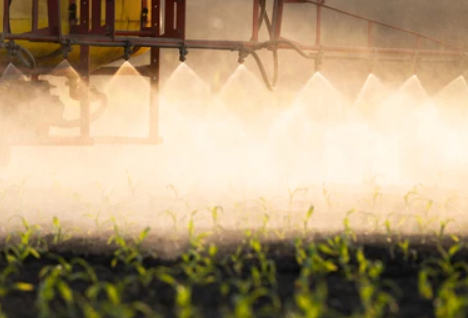Organochlorine Pesticides
The Severity of Environmental Contamination Caused by Organochlorine Pesticides
 Fig. 1 The chemical structure of DDT
Fig. 1 The chemical structure of DDT
Organochlorine pesticides (OCPs) refer to organic compound pesticides that are used to prevent and control plant diseases and insect pests and contain organochlorine elements in their composition. It is mainly divided into two categories: benzene as raw material and cyclopentadiene as raw material. OCPs that use benzene as raw materials include DDT, methoxy DDT, ethoxylate, dicofol, pentachloronitrobenzene, etc. OCPs using cyclopentadiene as raw materials include chlordane, heptachlor, endosulfan, aldrin, etc. Chlorobenzene has a relatively stable structure and is difficult to decompose. It will directly pollute crops and remain in the soil in large quantities, polluting water bodies through rainwater. After bioaccumulation and the food chain, OCPs residues in the environment will further accumulate and diffuse. OCPs that enter the human body through the food chain can even be excreted through breast milk, or transferred to tissues such as eggs, affecting offspring.
The Necessity of Monitoring Organochlorine Pesticide Residues with ELISA Testing

Organochlorine pesticides enter the human body, which can inhibit the metabolism of inositol and strongly stimulate the excitement of the central nervous system. The main manifestations are headache, dizziness, salivation, insomnia, and abnormal head and face. In addition to the obvious aggravation of the above symptoms, severely poisoned patients also have a high fever, muscle contraction, seizures, coma, and even death. It is worth noting that some OCPs reported in the literature are carcinogenic to laboratory animals. With the widespread use of OCPs, the public is increasingly concerned about their environmental pollution, animal and plant health risks. Various countries have formulated very strict standards for the residues of OCPs. To monitor the environmental contamination of OCPs, ELISA has become an important detection method for the determination of pesticide residues.
ELISA Type
Competitive Indirect ELISA
The Advantages of ELISA Testing
- Can quickly detect the residue of OCPs
- High-throughput detection and analysis of OCPs
- No special treatment is required for the sample to be tested
ELISA Procedure for Organochlorine Pesticide Residues Testing
Creative Diagnostics has been committed to pesticide residues testing by ELISA. Supported by rich professional knowledge and diversified ELISA kits products, we provide high-quality customized ELISA kits services, professional ELISA testing services, and ELISA development services, related to the detection of OCPs. If you wish a lot of careful data, please contact us.
References
- Yin, S.; et al. Organochlorine pesticides exposure may disturb homocysteine metabolism in pregnant women. Sci Total Environ. 2020, 708: 135146.
- Hongsibsong, S.; et al. Development and application of an indirect competitive enzyme-linked immunosorbent assay for the detection of p,p'-DDE in human milk and comparison of the results against GC-ECD. J Agric Food Chem. 2012, 60(1): 16-22.
